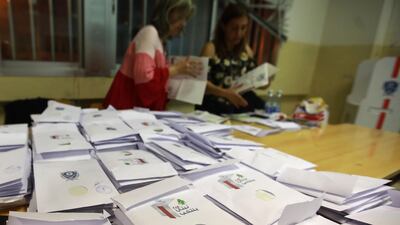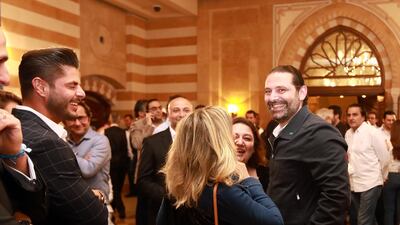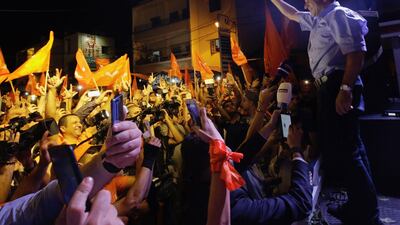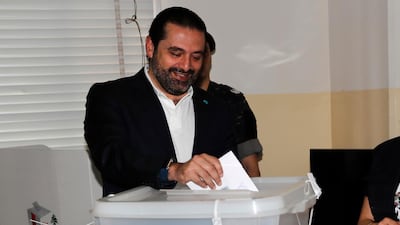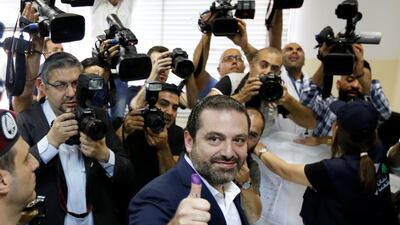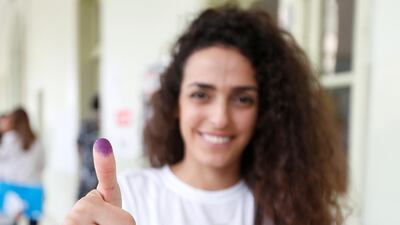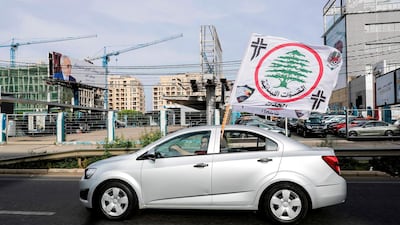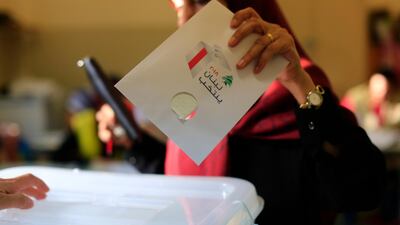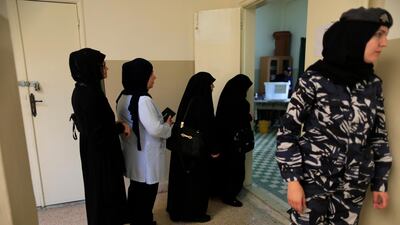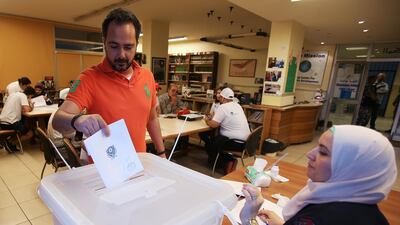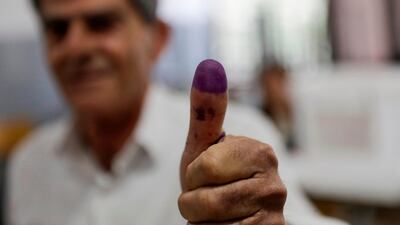Frantic last-minute calls from leaders across the Lebanese political spectrum appeared to energise voter turnout on Sunday from strikingly low levels to almost 50 per cent in the country’s first election since 2009.
The parliamentary election was initially marked by a lukewarm turnout, with early government estimates reporting less than a quarter of those registered to have voted by mid-afternoon. The toll forced officials to demand that an apparently disenchanted public get out and exercise its right to vote.
Five hours before voting closed, the interior ministry reported just 24.47 per cent had cast their votes, alarming Lebanon’s political elite. That low number pushed the country’s 83-year-old Maronite Christian President Michel Aoun to deliver a televised address in which he urged the electorate to head to the polls.
Mr Aoun said he was “surprised with the low turnout” ahead of the dramatic increase late on.
"If you are there, then of course the time will be extended so you can all vote”, he said in his televised address.
But an hour before voting closed at 7pm local time, the Lebanese government reported nationwide turnout to be 46.88 per cent, still a noticeably lower figure than the 54 per cent reported in the last election held nine years prior. Results for more than 500 candidates running in 128 seats in the Lebanese National Assembly are expected to be delivered on Monday at the earliest.
In a bid to allow more citizens to vote, officials held last-ditch discussions about the possibility of keeping the ballot boxes open past the deadline. Hezbollah's deputy secretary-general Naim Qassem had talks with Interior Minister Nohad Machnouk about an extension.
"We suggest voting be extended for two hours", he said.
Extensions were given to those who were already waiting at voting centres when the clock hit 7pm. Officials said a slow voting process had prevented many from voting in time.
Ahmad Hariri, the secretary-general of Prime Minister Saad Hariri’s Future Movement, called on voters to protect “all of Lebanon”.
"No one should underestimate the importance of their vote or think that heading down to the ballot box is too much to ask”, he said.
Voting in Beirut districts was between 30 and 40 percent, lower than the latest national toll, according to the country’s National News Agency.
Observers said before the election that the country’s youth is weary of a political elite laden with charges of corruption that has left voters with no viable alternatives, coupled with a new proportional voting system that has confused some of the Lebanese electorate.
The late rally may lessen the spotlight on voter apathy, but the calls demonstrated the fears of politicians – be it Shia, Sunni Muslim, Christian or Druze – that voter numbers would fall embarrassingly short and open them up to losses against independent candidates.
"In the last quarter of the hour, we have to raise the voter turnout to the maximum, like the beautiful partridges of our mountains", Druze chief Walid Jumblatt tweeted.
_______________
Read more:
In Lebanon, women vote but few are chosen
Lebanon paves way to election as regional tension soars
A bloody history that encapsulates Lebanon's woes
_______________
Lebanon has long served as a battlefield for influence between Iran and Saudi Arabia, who have supported Shiite group Hezbollah and Sunni Muslim leader Hariri respectively, and their results will be closely monitored inside and outside of the country.
Hezbollah has provided the regime of Syrian President Bashar Al Assad with thousands of fighters since 2011, preserving his position in Damascus after seven bloody years of civil war. It is a move that has drawn criticism from Sunni and Christian quarters in the country, who say that it risks embroiling Lebanon in a wider regional conflict.
While this election was not expected to rock the balance of power between the country’s established parties, the prospect of a low turnout boosted the chances of independents winning seats.
But Hezbollah, a group backed by the Iranian regime, is expected to fare well in the vote amid reports of intimidation by the militia’s supporters. Last month, independent Shia candidate Ali Al Amin, standing against Hezbollah and Amal, another dominant Shia party, said 30 Hezbollah supporters beat him up as he placed an election poster in the southern Lebanese town of Bint Jbeil.
Mr Hariri, while expected to be unable to hold all of his seats in parliament, is predicted to win another term as prime minister.
The country has been wracked by political paralysis and the knock-on effects of the Syrian civil war since its last vote nine years prior. More than a million Syrian refugees have entered the country’s borders since then and the country’s lawmakers failed to decide on a prime minister between 2014 and 2016.
Lebanon’s parliamentary make-up reflects the amalgamation of communities, religions and sects living side-by-side in the country. Parliament seats are divided evenly between Muslims and Christians, and further subdivided among their various sects. Lebanon's president must always be Maronite Christian, the prime minister Sunni Muslim and the parliament speaker a Shia Muslim.
